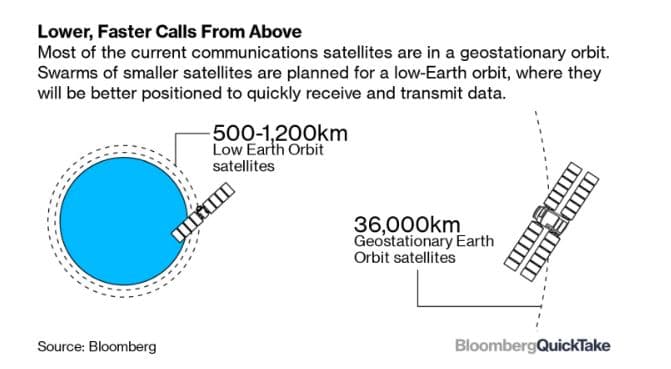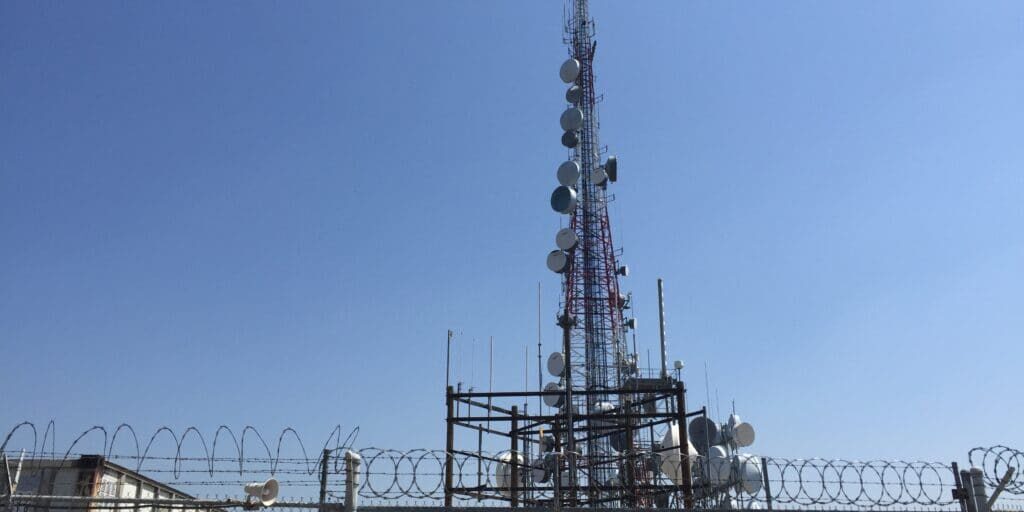What are the future of cell towers? Before we dive into our crystal ball to find the hidden answers of the future, we must explore the past.
When Was The First Cell Tower Built?
The first cell tower was built by AT&T in 1977. Known as the Chicago test cellular network. The FCC first approved commercial cell phones in 1982. By 1984 there were 25,000 cell phone users. Check out this groovy promotional video by AT&T made in 1979 promoting the first cellular network.
According to Pew Research, as of June 12 2019, 96% of Americans now own a cell phone of some kind. With the U.S. population estimated to be around 330 million, that would mean an estimated 316 million Americans now own a cell phone.
Will Low Orbit Satellites Replace Cell Towers?
In the last few decades the idea of replacing cell towers with satellite technology did not make business sense. This was due to the high-costs of launching satellites into space and the on-going need to physically access the satellites for equipment upgrades. Then there is the problem with servicing broken satellites, or upgrading satellites with new equipment to keep up with the rapid evolution of wireless communications.
Fast forward to 2020 and there are plans in place to replace the need for cell towers with low orbit satellites.
In May of last year SpaceX launched 60 of a planned 12,000 Starlink satellites into low orbit. The CEO of SpaceX, Elon Musk, has a vision that the satellites will form a network providing high-speed internet service to consumers like you and I down here on Earth.
He is not the only one.
CEO of Amazon Jeff Bezos pulled back the curtain on Project Kuiper, which is their plans to launch a 3,236 statellite constellation. Other companies with similar plans are OneWeb and Telesat.
Why Low Orbit Satellites?
As shown in the image below, lower orbit minimizes the distance between the satellite and the end user. The shorter distance decreases latency allowing for faster calls and the exchange of data. This is opposed to what they call Geostationary Earth Orbit Satellites.
Low orbit satellites are very close to Earth and as a result will provides speeds comparable to that of wired cable or fiber broadband.

Low orbit satellites are also not subject to negative attributes of cell towers on the ground, such as paying landlords monthly rent and the shadowing affect of antennas (antennas sending out their signal which is then blocked by topography such as buildings, hills, and heavy trees).
What About Direct-to-Direct Cellular Communications?
The technology giant Qualcomm in collaboration with Deutsche Telecom (the parent company of T-Mobile) has been working on LTE direct technology which may offer a window into our future. LTE Direct is a device-to-device technology that does not use cell towers.
Your device would discover thousands of other devices and services within 500 meters of your proximity. This would be useful, for example, to find your friend or a sale in a nearby store that may interest you. At this time, it is not a replacement technology for voice and data traffic, but if anyone can be a threat to phase out cell towers it’s the multi-billion dollar giant Qualcomm.
Will Wireless Industry Consolidation Continue?
Absolutely! In recent years, AT&T purchased Cricket, T-Mobile purchased Metro PCS, and Sprint purchased Nextel. With each of these acquisitions cell towers were decommissioned due to overlapping coverage.
Industry consolidations are not yet over and will continue as carriers strengthen financially and other carriers become prime business opportunities for acquisition. Currently T-Mobile is trying to acquire Sprint, however, the merger is being challenged in court.
What Is The Future Of My Cell Tower?
Technology is rapidly evolving and while it is unlikely the above mentioned technologies will replace cell towers tomorrow, it is certain that one day in the future we will not need cell towers.
If we look at history our communications have always continued to evolve. From smoke signals to radio to the landline telephone. Cell towers have only been around for 40 years, which is only a generation. Will they be around for another 40 years? Not if Musk, Bezos, Qualcomm, Verizon, AT&T, and T-Mobile have something to say about it.
Are you unsure of what the future holds for your cell tower? Give us a call at (888) 443-5101 and we will be happy to discuss with you what we are seeing on the market.
Related Articles
7 Comments
Leave a Comment

About Nick G. Foster
Since founding Airwave Advisors® in 2014, Mr. Foster has added value to over 400 clients ranging from the State of Nevada, City of Beverly Hills, to Habitat For Humanity. Mr. Foster focuses on cell tower lease renewals, buyouts, new lease negotiation, and cell site lease management. Prior to starting Airwave Advisors® Mr. Foster founded and led the Cell Site Services Group within nationwide commercial real estate services leader Cassidy Turley (now known as Cushman & Wakefield).




This is quite interesting and impressive to read of what is happening in the developed world with the fast advancing technology for communication. Living in this third world country where data purchase is quite expensive added with poor internet connectivity, I am only wishing that we all could live in a better and fair world one day to experience such equally referring to the UN 17 Sustainable Goals to Transform Our World. The Sustainable Development Goals are a call for action by all countries – poor, rich and middle-income – to promote prosperity while protecting the planet.
We currently rent out to T-mobile as well and I was wondering if it would be wise to sell for a lump sum as opposed to continuing to collect rent.
Hello,
Trying to figure out if you want to sell your lease or continue to collect rent is a personnel decision that depends on many factors. If you ever are thinking about selling your cell tower lease, give us a call and we can walk you through the process of figuring out if it is the best option for you.
All the best,
Nick G. Foster
Everything that goes up eventually comes back down. What type of protections will be in place when the satellites fall out of orbit?
Mrs. Prehn,
Depending on how close the orbit is to earth, according to a quick google referencing a NASA web page, the satellite would fall out of orbit and burn up in the Earth’s atmosphere, or they can use the last bit of fuel left in the satellite to jettison it deeper into outer space.
Nick G. Foster
Thank you for your explanation of cell towers and the future of satellites in this fast moving industry. I am a landlord of T-mobile’s antennas but sold my lease for a lump sum. Now they want to put 5g on my roof, but I have reservations about that. It would be more settling to me if the technology moved on without all of the new construction.
Hi Tom,
Installing a cell site on a roof can be a big deal. I think many Americans are on the same page with you that they wish technology would just advance to the use of satellites full time for our communications needs.
If you need any assistance reviewing the rooftop plans, please feel free to give us a call at (888) 443-5101.
All the best,
Nick G. Foster